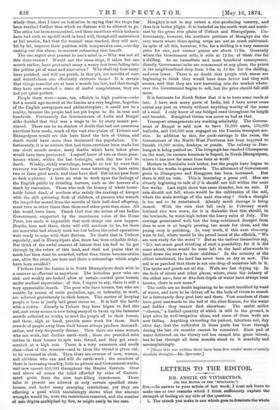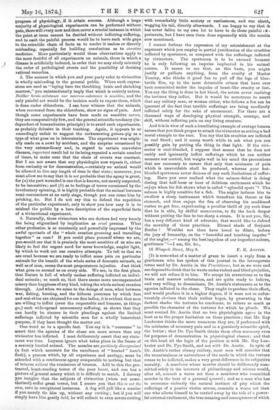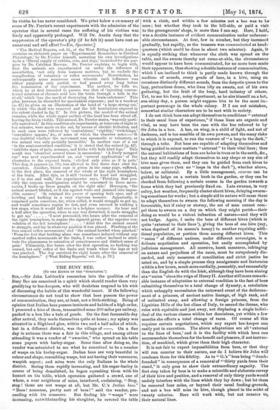LETTERS TO THE EDITOR.
DR. ANSTIE ON VIVISECTION.
[TO TEN EDITOR OF T1111 "EPEOTATOR:1
SIR,—In answer to your article of last week, I must ask leave to make one or two remarks which I think sufficiently explain the strength of feeling on my side of the question.
1. The attack you make is one which goes to frustrate the whole
progress of physiology, if it attain success. Although a large majority of physiological experiments can be performed without pain, therewill every now and then occur a crucial instance in which the point at issue cannot be decided without inflicting suffering, and to omit the painful process would be to leave such wide gaps in the scientific chain of facts as to render it useless or directly misleading, especially for building conclusions as to curative medicine. More particularly would these observations apply to the moat fruitful of all experiments on animals, those in which a disease is artificially induced, in order that we may study minutely the order of pathological events and the possibility of devising rational remedies.
2. The manner in which you and your party refer to vivisection is wholly misleading to the general public. When such expres- sions are used as "laying bare the throbbing brain and shrinking marrow," you unintentionally imply that which is entirely untrue. Neither brain-substance nor ?narrow-substance is sensitive, and the only painful act would be the incision made to expose them, which is done under chloroform. I can bear witness that the animals, when recovered from the chloroform, show no signs of pain. And though some experiments have been made on sensitive nerves, they are comparatively few, and the general scientific tendency (in- dependent of humanitarian principle) is to avoid such experiments, as probably delusive in their teaching. Again, it appears to us exceedingly unfair to suggest the corkscrewing guinea-pig as a type of what goes on in laboratories. The experiment was origin- ally made on a newt by accident, and the surprise occasioned by the very extraordinary and, in regard to certain convulsive diseases, important result led to its being repeated a certain number of times, to make sure that the chain of events was constant. But I am not aware that any physiologist now repeats it, either from curiosity or for demonstration,—certainly no animal would be allowed to live any length of time in that state ; moreover, you must allow me to say that it is not probable that the agony is great, for (a) the part wounded is one that is known, not merely suspected, to be insensitive ; and (b) as to feelings of terror occasioned by the involuntary spinning, it is highly probable that the animal becomes semi-unconscious at an early stage, though you can rouse him by pricking, &c. But I do not say this to defend the repetition of the particular experiment, only to show you how easy it is to mislead the public by a bare description of the superficial facts of a vivisectional experiment, 3. Naturally, those vivisectors who are doctors feel very keenly the being stigmatised by implication as cruel persons. What other profession is so constantly and powerfully impressed by the awful spectacle of the "whole creation groaning and travailing together" as ours? If you could place yourself where we are, youwould see that it is precisely the most sensitive of us who are likely to feel the urgent need for surer knowledge, ampler light, by which to work out our curative attempts. To tell us that we are cruel because we are ready to inflict some pain on particular animals for the benefit of the whole series of domestic animals, as well as of man, seems the most preposterous injustice. Just think what goes on around us on every aide. We see, in the first place, -that Nature is full of wholly useless suffering inflicted on indivi- dual animals ; so much so, that there seems more uncompensated misery than happiness of any kind, taking the whole animal creation -through. And when we come to the doings of men, what between war, fishing, bunting, and the hideous processes by which furs and seal-skins are obtained for our fine ladies, it is evident that men are willing to inflict (even the respectable and humane, as things go,) such wide-spread unnecessary suffering, as shows that they can hardly be sincere in their pleadings against the limited sufferings inflicted by scientific men for a wholly benevolent purpose, if they have thought the matter out.
One word as to a specific fact. You say it is " nonsense " to -assert that the agonies of the chase are more severe than any vivisector has inflicted. I most deliberately assert that my state- ment was true. Laymen ignore what takes place in the frame of a severely hunted animal. The muscles are positively disorganised (a fact which accounts for the excellence of " hunted " hare's flesh), a process which, by all experience and analogy, must be attended with a continuous agony comparable to nothing but that of tetanus without the remissions of tetanus. Add to this the pro- tracted, heart-rending terror of the poor beast, and one has a picture of general misery which it is difficult to match. I daresay you imagine that the subjects of vivisection (when not apses- thetised) suffer great terror, but I assure you that this is not the case, save in exceptional instances. A dog will yell like a maniac if you merely tie him up, without any cutting ; but if you will simply have him gently held, he will subMit to even severe cutting
with remarkably little anxiety or restlessness, and run about, wagging his tail, directly afterwards. I am happy to say that it has never fallen to my own lot to have to do these painful ex X. periments, but I have seen them done repeatedly with the results now mentioned.
I cannot forbear the expression of my astonishment at the argument which you employ in partial justification of the cruelties inflicted by sportsmen, as compared with the sufferings inflicted by vivisectors. The sportsman is to be excused because he is only following an impulse implanted in his animal nature. It seems to me that, on this basis, you might justify or palliate anything, from the cruelty of Master Tommy, who thinks it good fun to pull off the legs of blue- bottle flies, up to the most detestable crimes that have ever been committed under the impulse of beast-like cruelty or lust. You say the thing is done in hot blood, the actors never realising the tortures they inflict. But it would be monstrous to assert that any solitary man, or woman either, who follows a fox can be ignorant of the fact that terrible sufferings are being needlessly inflicted solely for the sake of amusement. For there are a thousand ways of developing physical strength, courage, and skill, without inflicting pain on any living creature.
And it is in view of such a humiliating example of average human nature that you think proper to attack the vivisector as setting a bad moral example to the race. You say that his cruelties are inflicted in cool blood ; and it seems worth while to ask what you can possibly gain by putting the thing in that light. If the vivi- sector is cool-blooded, I suppose that means that he does not rashly and ignorantly inflict sufferings which he can neither measure nor control, but weighs well in his mind the precautions that are necessary to ensure that only that minimum of pain which is unavoidable shall be produced, whereas your hot- blooded sportsman never dreams of any such limitations of suffer- ing. Have you ever realised what the salmon-fisher is doing during that half-hour or hour of delirious excitement which he enjoys when his fish shows what is called "splendid sport "? The salmon is highly sensitive for a fish. The angler induces him to swallow a sharp instrument which transfixes his throat or his stomach, and then enjoys the fun of observing his maddened rushes to get free, experiencing a peculiar thrill of joy each time that he is able, by skilful manceuvres, to fix the hook deeper without putting the line to too sharp a strain. It is not you, Sir, but a very different kind of advocate, that would like to defend
the morality of these practices. Blessed shade of Serjeant Buzfuz ! Wouldst not thou have loved to dilate, before the jury of humanity, on the "beautiful and touching impulse" of the angler,—" among the beet impulses of our imperfect nature, gentlemen "!—I am, Sir, &c.,
Ut is somewhat of a matter of grace to insert a reply from a gentleman who has spoken of this journal in the intemperate terms used by Dr. Anstie in the Practitioner, but as we were and are disposed to think that he wrote under violent and blind prejudice, we will not refuse it to him. We accept his corrections as to the brain and marrow substances, and are quite ready to believe, and very willing to disseminate, Dr. Anatie's statements as to the agonies inflicted in the chase. They ought to produce their effect, and would produce it in a higher degree, if it were not so unfor- tunately obvious that their author hopes, by presenting in the darkest shades the tortures he condemns, to relieve as much as possible the character of the tortures for which be plead.. We must remind Dr. Anstie that no two physiologists agree in the least as to the proper limitation on these practices ; that Mr. Ray Laukester thinks the more numerous they are, if performed with the minimum of necessary pain and in a genuinely scientific spirit, the better ; that Dr. Pye Smith thinks them often necessary even for purposes of demonstration to physiological classes ; and that on this head all the logic of the position is with Mr. Ray Lan- kester and Dr. Pye Smith, and not with Dr. Anatie. In spite of Dr. Anstie's rather clumsy raillery, most men will consider that the unnaturalness or naturalness of the mode in which the torture comes to be inflicted, makes a very great difference in its subjective morality. A murderer whose murder should be deliberately com- mitted solely in the interests of philanthropy and science would, after all, commit a worse act than a murderer who committed murder in the heat of a personal quarrel ; and so a man who has to overcome violently the natural instinct of pity which the sufferings of a passive victim arouse, commits a worse act than one who allows himself to be carried away by the tide of a power- ful external excitement, the true meaning and consequences of which
its victim he has never considered. We print below a en mmary of some of Dr. Ferrier's recent experiments with the admission of the operator that in several cases the suffering of his victims was lively and apparently prolonged. Will Dr. Anstie deny that the suppression of the operator's pity (if he felt it) must have cost an unnatural and evil effort ?—En. Spectator.]
‘- The Medical Reports, vol. iii., of the West Riding Lunatic Asylum contains an elaborate paper on 'Experimental Researches in Cerebral Physiology,' by Dr. Ferrier himself, narrating his own investigations upon a liberal supply of rabbits, cats, and dogs,' furnished for the pur- pose by Dr. Crichton Browne. Dr. Ferrier explains, to begin with, that the animals are experimented on under the influence of anesthetics, not only from humane motives, but to exclude the complication of voluntary or reflex movements.' Nevertheless, he subsequently notes numerous cases wherein such influence was either purposely only partial, or had passed away long before the tormination of the experiment. The method, he tells us, which he at first intended to pursue was that of 'injecting concen- trated solutions of chromic acid into the brain through a hole in the winch has the merit of destroying the brain-substance.' This plan, however, he discarded for mechanical exposure ; and in a woodcut (p. 37) he gives us an illustration of the head of a large strong cat,' in which • the skull was removed and the left hemisphere exposed to the extent shaded in fig. 2.' In this picture, the nostril of the animal remains, while the whole upper surface of the head has been sliced off, leaving the brain visible. This animal, Dr. Ferrier states, 'was only parti- ally narcotised.' In this condition six experiments, at intervals of eight or ten minutes, were made on the cat, by means of electric irritation, and in each case were followed by 'convulsions," rigidity," twitchings,' convulsive spasms,' &c., of some of which the observer notes
was doubtful whether the movement was spasmodic or voluntary, as the animal was only partially insensible. In another case of a cat in the semi-narcotised condition,' it is stated that the animal (p. 42), exhibits signs of pain, screams, and kicks with both hind legs.' This result was observed several times in succession.' A lively mongrel cur' was next experimented on, and 'several applications' of the electrodes to the exposed brain, ' elicited only cries as if in pain.' This dog, it appears (p. 78), was allowed to live three days after the operation. Another, whose case is given in the same page, suffered, in the first place, the removal of the whole of the right hemisphere of the brain. After this, as it still turned its head and struggled, as if to rise and walk,' the experimenter says, Thinking that pos- sibly the corpora quadrigemina might be concerned in these move- ments. I broke up these ganglia on the right side.' Hereupon, 'the animal seemed blinded, as it ran against walls and jammed into impos-
sible corners.' It retained the power of opening both eyes, and of howling and barking in a very vigorous manner. Apparently, it remained quite conscious, for, when called, it would struggle to got up, and would sometimes regain its feet, and even succeed in walking a few steps, when it would fall over in a helpless manner. An hour and a half after the operation, when in any way disturbed, it made struggles
to get up.' '1 next proceeded, two hours after the removal of the right hemisphere, to expose the sigmoid gyms of the superior con- volution of the left hemisphere.' . . . . After this the animal ceased to struggle, and lay in whatever position it was placed. Pinching of the toes caused reflex movements,' and the animal howled when pinched.' 'From the fact that barking alone was sometimes induced without any marked reflex movements of the limbs, I was rather inclined to attri- bute the phenomena to retention of consciousness and distinct sense of pain.' Ultimately, five hours after the first operation, no barking was caused, but only reflex of the limbs and trunk when the logs or tail was pinched. The dog survived for eight hours after the removal of the hemisphere." (' West Riding Reports,' vol. iii., p. 79.)




































 Previous page
Previous page